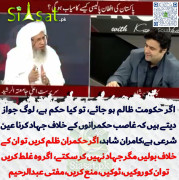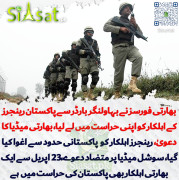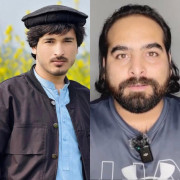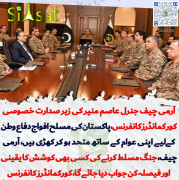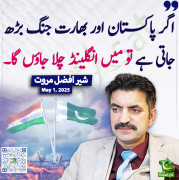awan4ever
Chief Minister (5k+ posts)
Indo-Iran relations are warming up again. These cooled off when India, in order to win American favors, did not stand by Iran and abstained from voting in the UN General Assembly on a Canada-sponsored resolution against its human right violations. This was seen as Indian retaliation for Iran’s Ayatollah Ali Khamenei equating Kashmir with Afghanistan and Gaza in Palestine. Tehran and New Delhi are due to start a new round of negotiations on the latter’s investment in major Iranian oil and gas projects. According to Fars News Agency has reported that an Indian delegation is scheduled to visit Iran next week to discuss investments in Iran’s giant South Pars Gas Field and supply of certain expensive oil equipment, like drilling platforms and towers, in meetings with Iranian officials.
Also, the Iranian and Indian officials are slated to talk about New Delhi’s return to the peace pipeline project currently under construction on both the Iranian Pakistani territories. India has stayed out of the Iran-Pakistan-India gas pipeline (also known as the Peace Pipeline) project because of its failure to strike a deal on transition fees with Pakistan. The 2700-kilometer long pipeline was to supply gas for Pakistan and India which are suffering a lack of energy sources, but India later evaded talks. Last year Iran and Pakistan declared they would finalize the agreement bilaterally if India continued to be absent in meetings. According to the project proposal, the pipeline will begin from Iran’s Assalouyeh Energy Zone in the south and stretch over 1,100 km through Iran. In Pakistan, it will pass through Baluchistan and Sindh but officials say the route may be changed if China agrees to the project.
It is expected to cost $7.4 billion. But the intangible costs are much more than that. Kashmir Watch has narrated how Iran backstabbed Pakistan when it abstained from voting asking for imposing sanctions on India for human rights violation in Kashmir thus saving India at the cost of Kashmiris. The story goes like this:
On a winter morning, with the Elbruz Mountains overlooking Tehran airport still under snow, braving cold winds, a special Indian military plane touched down. On board was an ailing Dinesh Singh, then External Affairs Minister, along with three others. Barely able to walk, Singh had been dragged out of a hospital bed to deliver an urgent letter from Prime Minister P. V. Narasimha Rao to Iranian President Ali Akbar Hashemi Rafsanjani. Incidentally, this was the last such tour in the 50-year diplomatic career of Singh.
Having mortgaged its gold reserves two years ago, India was on the economic brink and Russia still licking its wounds after the break-up of the Soviet Union. The Organization of Islamic Countries (OIC), supported by influential Western nations, was pushing a resolution at the UN Commission Human Rights (UNCHR), later rechristened as Human Rights Council, to condemn India for human right violations in Kashmir. The resolution, with UNCHR approval, was to be referred to the UN Security Council for initiating economic sanctions and other punitive measures against India. As in the International Atomic Energy Agency (IAEA), in the OIC, too, decisions are by consensus. Once there is no consensus in the OIC, the resolution was bound to fall through.
The Iranians had no clue to the Indian Minister’s mission. Casting aside protocol, Iranian Foreign Minister Dr. Ali Akbar Velayati was at the airport when Singh alighted. Velayati asked what on earth could be of such momentous importance for Singh to risk a perilous journey in his precarious condition. In reply, Dinesh Singh smilingly handed over a demarche.
In the course of the day, he went through his “Kashmir brief” diligently in meetings with his Iranian interlocutors, namely, Velayati, President Rafsanjani and Iranian Majlis Speaker Nateq-Nouri. By evening, Singh returned to his hospital bed in Delhi, but with an assurance from President Rafsanjani to Prime Minister Rao “that Iran will do all it can do to ensure that no harm comes to India.”
What Iran gained by obliging India is an abiding mystery? Only after 72 anxious hours did Delhi learn that Iran had killed the OIC move to table the resolution. This marked a new chapter in India-Iran relations with wider consequences. Iran distanced itself from Pakistan in the matter of Afghanistan; and, India joined hands with Iran to promote the Northern Alliance, which was inimical to Pakistani interests. Pakistan was shocked by what it termed as “backstabbing”.
The Indian delegation to the UNCHR led by Leader of the Opposition Atal Behari Vajpayee comprised minister of state for external affairs Salman Khurshid and Farooq Abdullah. Basking in this diplomatic victory, Vajpayee and Abdullah were unaware that, three days ago, Dinesh Singh had laid the ground for it in Tehran; and Rao never tried to steal the credit from Vajpayee and Abdullah.
Much later, it came to be known that when the Pakistani ambassador sought to move the OIC resolution, his Iranian counterpart in Geneva, under orders from Teheran, backed out. He argued that as a close friend of both India and Pakistan, Iran was ready to sort out their problems and there was no need to raise these in an international forum. That was the last time Pakistan tried to get a resolution on the Kashmir issue tabled in a UN forum.
Now, the wheel has come full circle. Iranian officials say their gesture was not reciprocated, and accuse India of “backstabbing” by voting against Iran at the IAEA. The vote had already sealed the fate of the Iran-Pakistan-India gas pipeline. Tehran which had earlier committed to provide gas below 3 dollars per British Thermal Unit (BTU) now wants a commercial price of 9 dollars.
These officials link India’s growing proximity to US, aspirations for global economic and political power, early conclusion of civilian nuclear agreements with Western powers leading it to distance itself from Tehran. The pipeline was to begin gas supply in 2012. The 7.5-billion-dollar, 2,700-kilometre pipeline has been under discussion for almost two decades. The pipeline is to begin from Iran’s Assalouyeh energy zone in the south and run over 1,100 kms through Iran. In Pakistan it is to pass through Balochistan and Sindh before linking up Rajasthan and Gujarat.
Iran was angered when India abstained on the Canada-sponsored resolution, and subsequently summoned Iran’s Charge De Affairs Reza Alaei and issued a demarche for Khamenei impinging on the country’s territorial integrity. The Iranian leader’s appeal to the world’s Muslim elite to back the “struggle” in Jammu and Kashmir, equating it with the “nations” of Afghanistan, Iraq and Pakistan had New Delhi bristling. In its official reaction, the Ministry of External Affairs said: “Our decision on the vote was made after due deliberation.”
India disapproved of Khamenei’s message to Hajj pilgrims that “today the major duties of the elite of the Islamic Ummah are to provide help to the Palestinian nation and the besieged people of Gaza, to sympathize and provide assistance to the nations of Afghanistan, Pakistan, Iraq and Kashmir, to engage in struggle and resistance against the aggressions of the United States and the Zionist regime.”
Since July this year, on three occasions Iran has spoken of support to the “struggle” in Kashmir and bracketed the situation in the state with that in Gaza and Afghanistan, sources said. “We have conveyed to the Iranian authorities our deep disappointment and regret that they have chosen to disregard our sensitivities and question our territorial sovereignty”.
Though the government has often denied that deterioration of relations was due to its hobnobbing with the US and Israel, analysts believe the chill arises from a series of developments, including India opting out of the tri-nation gas pipeline and President Obama seeking India’s support against Iran’s nuclear armament. In 2008, Tehran had protested at India deploying for the first time ever a warship in the Persian Gulf region, which operated in coordination with the western navies under the North Atlantic Treaty Organization (NATO).
More recently, on September 18, Iran’s Foreign Ministry spokesman Ramin Mehmanparast had slammed the killing of 15 Muslim protesters in Kashmir who were outraged by the threat to defile the Holy Qur’an in the US. He had said that countering such reactions could be interpreted as supporting acts of sacrilege. These comments evoked a strong diplomatic protest from New Delhi as it had not only banned the Iranian TV channel showing provocative and “unverified” visuals but also summoned Iranian envoy to lodge a protest. India pointed out that law and order in Jammu and Kashmir was an internal matter and Iran had no right to interfere or comment on these issues.
http://fmeducation.wordpress.com/2010/12/11/did-iran-backstab-pakistan-to-save-india/
Also, the Iranian and Indian officials are slated to talk about New Delhi’s return to the peace pipeline project currently under construction on both the Iranian Pakistani territories. India has stayed out of the Iran-Pakistan-India gas pipeline (also known as the Peace Pipeline) project because of its failure to strike a deal on transition fees with Pakistan. The 2700-kilometer long pipeline was to supply gas for Pakistan and India which are suffering a lack of energy sources, but India later evaded talks. Last year Iran and Pakistan declared they would finalize the agreement bilaterally if India continued to be absent in meetings. According to the project proposal, the pipeline will begin from Iran’s Assalouyeh Energy Zone in the south and stretch over 1,100 km through Iran. In Pakistan, it will pass through Baluchistan and Sindh but officials say the route may be changed if China agrees to the project.
It is expected to cost $7.4 billion. But the intangible costs are much more than that. Kashmir Watch has narrated how Iran backstabbed Pakistan when it abstained from voting asking for imposing sanctions on India for human rights violation in Kashmir thus saving India at the cost of Kashmiris. The story goes like this:
On a winter morning, with the Elbruz Mountains overlooking Tehran airport still under snow, braving cold winds, a special Indian military plane touched down. On board was an ailing Dinesh Singh, then External Affairs Minister, along with three others. Barely able to walk, Singh had been dragged out of a hospital bed to deliver an urgent letter from Prime Minister P. V. Narasimha Rao to Iranian President Ali Akbar Hashemi Rafsanjani. Incidentally, this was the last such tour in the 50-year diplomatic career of Singh.
Having mortgaged its gold reserves two years ago, India was on the economic brink and Russia still licking its wounds after the break-up of the Soviet Union. The Organization of Islamic Countries (OIC), supported by influential Western nations, was pushing a resolution at the UN Commission Human Rights (UNCHR), later rechristened as Human Rights Council, to condemn India for human right violations in Kashmir. The resolution, with UNCHR approval, was to be referred to the UN Security Council for initiating economic sanctions and other punitive measures against India. As in the International Atomic Energy Agency (IAEA), in the OIC, too, decisions are by consensus. Once there is no consensus in the OIC, the resolution was bound to fall through.
The Iranians had no clue to the Indian Minister’s mission. Casting aside protocol, Iranian Foreign Minister Dr. Ali Akbar Velayati was at the airport when Singh alighted. Velayati asked what on earth could be of such momentous importance for Singh to risk a perilous journey in his precarious condition. In reply, Dinesh Singh smilingly handed over a demarche.
In the course of the day, he went through his “Kashmir brief” diligently in meetings with his Iranian interlocutors, namely, Velayati, President Rafsanjani and Iranian Majlis Speaker Nateq-Nouri. By evening, Singh returned to his hospital bed in Delhi, but with an assurance from President Rafsanjani to Prime Minister Rao “that Iran will do all it can do to ensure that no harm comes to India.”
What Iran gained by obliging India is an abiding mystery? Only after 72 anxious hours did Delhi learn that Iran had killed the OIC move to table the resolution. This marked a new chapter in India-Iran relations with wider consequences. Iran distanced itself from Pakistan in the matter of Afghanistan; and, India joined hands with Iran to promote the Northern Alliance, which was inimical to Pakistani interests. Pakistan was shocked by what it termed as “backstabbing”.
The Indian delegation to the UNCHR led by Leader of the Opposition Atal Behari Vajpayee comprised minister of state for external affairs Salman Khurshid and Farooq Abdullah. Basking in this diplomatic victory, Vajpayee and Abdullah were unaware that, three days ago, Dinesh Singh had laid the ground for it in Tehran; and Rao never tried to steal the credit from Vajpayee and Abdullah.
Much later, it came to be known that when the Pakistani ambassador sought to move the OIC resolution, his Iranian counterpart in Geneva, under orders from Teheran, backed out. He argued that as a close friend of both India and Pakistan, Iran was ready to sort out their problems and there was no need to raise these in an international forum. That was the last time Pakistan tried to get a resolution on the Kashmir issue tabled in a UN forum.
Now, the wheel has come full circle. Iranian officials say their gesture was not reciprocated, and accuse India of “backstabbing” by voting against Iran at the IAEA. The vote had already sealed the fate of the Iran-Pakistan-India gas pipeline. Tehran which had earlier committed to provide gas below 3 dollars per British Thermal Unit (BTU) now wants a commercial price of 9 dollars.
These officials link India’s growing proximity to US, aspirations for global economic and political power, early conclusion of civilian nuclear agreements with Western powers leading it to distance itself from Tehran. The pipeline was to begin gas supply in 2012. The 7.5-billion-dollar, 2,700-kilometre pipeline has been under discussion for almost two decades. The pipeline is to begin from Iran’s Assalouyeh energy zone in the south and run over 1,100 kms through Iran. In Pakistan it is to pass through Balochistan and Sindh before linking up Rajasthan and Gujarat.
Iran was angered when India abstained on the Canada-sponsored resolution, and subsequently summoned Iran’s Charge De Affairs Reza Alaei and issued a demarche for Khamenei impinging on the country’s territorial integrity. The Iranian leader’s appeal to the world’s Muslim elite to back the “struggle” in Jammu and Kashmir, equating it with the “nations” of Afghanistan, Iraq and Pakistan had New Delhi bristling. In its official reaction, the Ministry of External Affairs said: “Our decision on the vote was made after due deliberation.”
India disapproved of Khamenei’s message to Hajj pilgrims that “today the major duties of the elite of the Islamic Ummah are to provide help to the Palestinian nation and the besieged people of Gaza, to sympathize and provide assistance to the nations of Afghanistan, Pakistan, Iraq and Kashmir, to engage in struggle and resistance against the aggressions of the United States and the Zionist regime.”
Since July this year, on three occasions Iran has spoken of support to the “struggle” in Kashmir and bracketed the situation in the state with that in Gaza and Afghanistan, sources said. “We have conveyed to the Iranian authorities our deep disappointment and regret that they have chosen to disregard our sensitivities and question our territorial sovereignty”.
Though the government has often denied that deterioration of relations was due to its hobnobbing with the US and Israel, analysts believe the chill arises from a series of developments, including India opting out of the tri-nation gas pipeline and President Obama seeking India’s support against Iran’s nuclear armament. In 2008, Tehran had protested at India deploying for the first time ever a warship in the Persian Gulf region, which operated in coordination with the western navies under the North Atlantic Treaty Organization (NATO).
More recently, on September 18, Iran’s Foreign Ministry spokesman Ramin Mehmanparast had slammed the killing of 15 Muslim protesters in Kashmir who were outraged by the threat to defile the Holy Qur’an in the US. He had said that countering such reactions could be interpreted as supporting acts of sacrilege. These comments evoked a strong diplomatic protest from New Delhi as it had not only banned the Iranian TV channel showing provocative and “unverified” visuals but also summoned Iranian envoy to lodge a protest. India pointed out that law and order in Jammu and Kashmir was an internal matter and Iran had no right to interfere or comment on these issues.
http://fmeducation.wordpress.com/2010/12/11/did-iran-backstab-pakistan-to-save-india/

